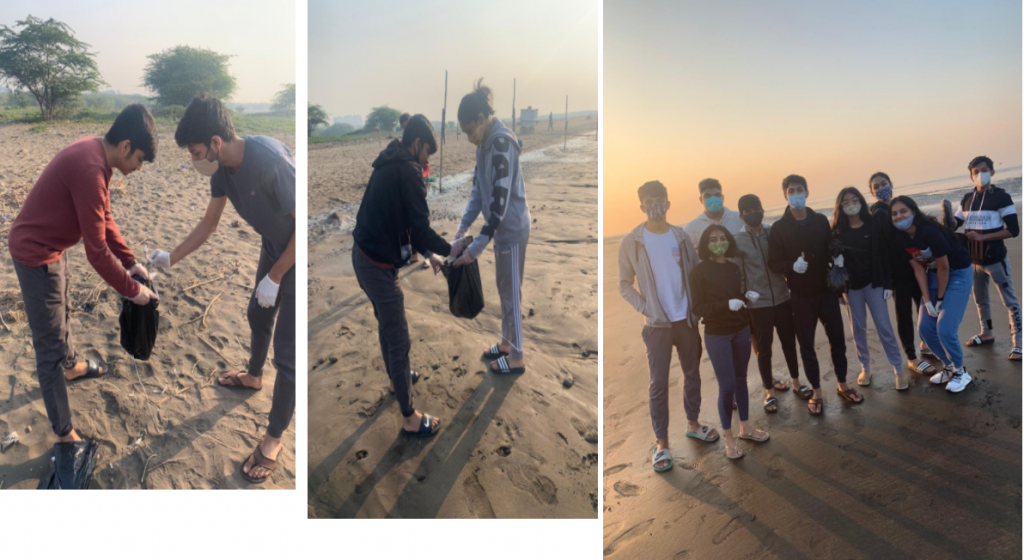In this activity we cleaned up one of the beaches in surat. It was a group task done by 5-10 students, each person was given their designated place to clean up the beach. For this activity our goal was to clean the beach as much as we could, we focused on sustaining the beach and on the issue of clean water and sanitation as the trashes on the beach tend to move its way to the water harming the living species that live in the water, and also infecting the water, which can not be used as drinking water or for any other use of water .we were distributed.
There were a few learning outcomes that we had achieved after doing this activity such as LO4, LO5, LO6 and LO7.
LO4 : Show commitment to and perseverance in CAS experiences
Commitment and perseverance from each of the group member was required as we decided to do it for three weekends and also we had to drive all the way to the beach which was quite Waking up early, deciding meeting points, carpooling, setting up schedules and plans and adhering to them required commitment and teamwork.
LO5 : Demonstrate the skills and recognize the benefits of working collaboratively
Cleaning a beach isn’t easy, particularly if you’re alone, but luckily that wasn’t the case. We were a group of friends who went to clean the beaches. The trash had to be filled into a large trash bag by each team. The issue that caused arguments was that nobody wanted to carry the trash-bag(due to its filthy nature). Nevertheless, we were able to sort out the problems by passing the bag around after a few time intervals. This plan made the whole process much simpler and smoother and we were able to cover more ground much faster.
LO6 : Demonstrate engagement with issues of global significance
The waste on the beach is not only unpleasant to look at but has a greater impact on the environment. When we ignorantly throw litter around the beach, we damage our environment profoundly, although not immediately but it’s effect gradually increases. Most of our waste goes into the ocean, which not only pollutes it but also causes harm to the organisms inside which leads to extinction of species, destruction of habitats and downfall of ecosystems both inside the ocean and outside on the shore.
Contributing to combat this issue made me feel like a responsible citizen of our world, the one who does not just speak the big talk but actually takes action about it. I saw people on the beach who were looking at us and I felt that they were inspired by what we were doing, if not to clean the beach but at least be more conscious of their actions. This made me feel like I am actually being a significant part of a big change, for the greater good of our planet.
LO7 : Recognize and consider the ethics of choices and actions
One of the biggest ethical issues that were involved in this activity was the global pandemic. Even though things were relatively in control and it was okay to go out with more than 2 people, it was still a risk for many of us as the beach is a public place and we ther was a chance that we would be exposed to the virus.
This issue affected us directly since our whole project was based on it. It made us feel helpless for some time because we almost gave up on going there as our parents were also concerned about our health.
However, thankfully, we came up with a solution. We made COVID guidelines together and made sure to follow them at all costs so that we stay as safe as possible. A few agreements included; to wear masks and gloves at all times, maintain social distancing with each other as well as the members of the public, carry a personal water bottle and hand sanitizer and also be as cautious as possible.
To conclude, I feel we as a team did a pretty good job in order to help the environment around us be clean and we must do this regularly so that we are connected to our surroundings.A learner profile attribute I developed was ‘caring’. It was notably interesting to see the other people at the beach observing us. They looked inspired by our initiative and would often come up to us to ask questions about what we were doing and what school we were studying at.
Evidence :
